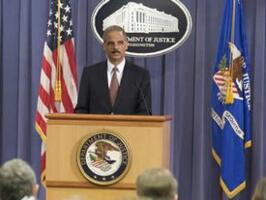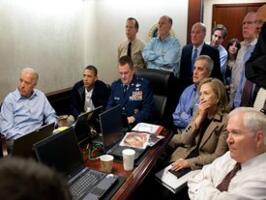What They Told Us: Reviewing Last Week’s Key Polls -- For The Week Endine June 1, 2013
Health care and housing are hotter topics for many Americans these days than the growing controversies surrounding the Obama administration.

Health care and housing are hotter topics for many Americans these days than the growing controversies surrounding the Obama administration.

As confidence among homeowners improves, more Americans than ever say now is a good time for someone to sell a house where they live.
A new Rasmussen Reports national telephone survey shows that 33% of U.S. Adults believe now is a good time for someone in their area to sell a home. That’s up three points from last month and the highest level measured in more than four years of regular tracking. But 45% still say now is not the time to sell a home in their area. Twenty-two percent (22%) are not sure. (To see survey question wording, click here.)
The survey of 1,000 Adults was conducted on May 24-25, 2013 by Rasmussen Reports. The margin of sampling error is +/- 3 percentage points with a 95% level of confidence. Fieldwork for all Rasmussen Reports surveys is conducted by Pulse Opinion Research, LLC. See methodology.

With the trial in the sensational Trayvon Martin case just two weeks away, Americans are closely divided over whether the man who shot the Florida teen last year should be found guilty of murder.
A new Rasmussen Reports national telephone survey finds that 31% of American Adults believe Neighborhood Watch volunteer George Zimmerman should be convicted of murder for shooting Martin. Nearly as many (29%) think he was acting in self-defense. But a sizable 40% are not sure. (To see survey question wording, click here.)
(Want a free daily e-mail update ? If it's in the news, it's in our polls). Rasmussen Reports updates are also available on Twitter or Facebook.
The survey of 1,000 Adults was conducted on May 28-29, 2013 by Rasmussen Reports. The margin of sampling error is +/- 3 percentage points with a 95% level of confidence. Field work for all Rasmussen Reports surveys is conducted by Pulse Opinion Research, LLC. See methodology.

Let's state this very simply, so everybody will understand. The notion that Barack Obama is "Nixonian" -- or that his administration's recent troubles bear any resemblance to "Watergate" -- is the biggest media lie since the phony "Whitewater scandal" crested during the Clinton presidency.

Most voters don’t approve of the U.S. Justice Department’s investigation of news reporters, and a plurality now thinks the department’s boss, Attorney General Eric Holder, should resign.
The latest Rasmussen Reports national telephone survey finds that just 25% of Likely U.S. Voters have a favorable opinion of Holder, while 47% view him unfavorably. This includes nine percent (9%) with a Very Favorable opinion and 32% with a Very Unfavorable view. (To see survey question wording, click here.)
(Want a free daily e-mail update? If it's in the news, it's in our polls). Rasmussen Reports updates are also available on Twitter or Facebook.
The survey of 1,000 Likely Voters was conducted on May 29-30, 2013 by Rasmussen Reports. The margin of sampling error is +/- 3 percentage points with a 95% level of confidence. Field work for all Rasmussen Reports surveys is conducted by Pulse Opinion Research, LLC. See methodology.

Most stories about the president's health care law these days are about the challenges of implementation and the complexity of setting up exchanges. But that's not where the action is. What's more important is that insurance companies, benefits consultants and others are actually reading the 2,000-page law to see what it says.

The Federal Bureau of Investigation is seeking legal permission to more easily wiretap Internet communications as telephone use declines, but most Americans aren't on board with this proposal.
A new Rasmussen Reports national telephone survey shows that just 17% of American Adults favor making it easier for the FBI to wiretap Internet communications such as instant messages, Facebook chats and e-mails. Sixty-seven percent (67%) oppose granting easier access to these types of communication. Fifteen percent (15%) are undecided. (To see survey question wording, click here.)
(Want a free daily e-mail update? If it's in the news, it's in our polls). Rasmussen Reports updates are also available on Twitter or Facebook.
The survey of 1,000 Adults was conducted on May 22-23, 2013 by Rasmussen Reports. The margin of sampling error is +/- 3 percentage points with a 95% level of confidence. Field work for all Rasmussen Reports surveys is conducted by Pulse Opinion Research, LLC. See methodology.

Views of President Obama's handling of national security issues have now fallen to levels not seen since before the killing of Osama bin Laden two years ago. A new Rasmussen Reports national telephone survey finds that just 40% of Likely U.S. Voters now give the president good or excellent ratings for his handling of national security issues. That's down from 46% two weeks ago and the lowest his positives have been since late April 2011. Nearly as many (39%) rate his national security performance as poor. This ties the finding earlier this month but marks a high he'd reached only once before in the previous two years. (To see survey question wording, click here.)
(Want a free daily e-mail update? If it's in the news, it's in our polls). Rasmussen Reports updates are also available on Twitter or Facebook.
The survey of 1,000 Likely Voters was conducted on May 27-28, 2013 by Rasmussen Reports. The margin of sampling error is +/- 3 percentage points with a 95% level of confidence. Field work for all Rasmussen Reports surveys is conducted by Pulse Opinion Research, LLC. See methodology.

Most voters don't believe they are getting a good return on current education spending, and just one-in-three think more money will enhance student performance.
A new Rasmussen Reports national telephone survey finds that only 13% of Likely U.S. Voters think American taxpayers are getting a good return on their investment in public school education. Sixty-eight percent (68%) don’t believe that to be true, while 19% are not sure. (To see survey questions wording, click here.)
(Want a free daily e-mail update? If it's in the news, it's in our polls). Rasmussen Reports updates are also available on Twitter or Facebook.
The survey of 1,000 Likely Voters was conducted on May 27-28, 2013 by Rasmussen Reports. The margin of sampling error is +/- 3 percentage points with a 95% level of confidence. Field work for all Rasmussen Reports surveys is conducted by Pulse Opinion Research, LLC. See methodology.

A thoughtful reformer targets the traditional rules of an aging institution that has retarded progress in the past. Time to modernize those rules, the reformer says, and prevent obstruction in the future.

The U.S. Supreme Court is expected to rule soon on a lawsuit challenging the University of Texas’ use of race as a factor in admissions. Most Americans believe affirmative action admissions policies discriminate against whites, as the lawsuit argues, and think it’s better for colleges and universities to accept the most qualified students.
The latest Rasmussen Reports national telephone survey finds that 25% of American Adults favor applying affirmative action policies to college admissions. Forty-four percent (44%) oppose such admissions policies, while 34% are undecided. (To see survey question wording, click here.)
The survey of 1,000 Adults was conducted on May 28-29, 2013 by Rasmussen Reports. The margin of sampling error is +/- 3 percentage points with a 95% level of confidence. Field work for all Rasmussen Reports surveys is conducted by Pulse Opinion Research, LLC. See methodology.

Democrats’ efforts to strengthen gun control laws may not have had the political impact they’d hoped for: Voters are becoming more likely to trust Republicans than Democrats on the issue.
A new Rasmussen Reports national telephone survey finds that 43% of Likely U.S. Voters trust the GOP more than Democrats when it comes to gun control. Slightly fewer (41%) still trust Democrats more. Seventeen percent (17%) are undecided. (To see survey question wording, click here.)
(Want a free daily e-mail update? If it's in the news, it's in our polls). Rasmussen Reports updates are also available on Twitter or Facebook.
The survey of 1,000 Likely Voters was conducted on May 23-24, 2013 by Rasmussen Reports. The margin of sampling error is +/- 3 percentage points with a 95% level of confidence. Field work for all Rasmussen Reports surveys is conducted by Pulse Opinion Research, LLC. See methodology.

For the third week in a row, 30% of Likely U.S. Voters say the country is heading in the right direction, according to a new Rasmussen Reports national telephone survey taken the week ending Sunday, May 26.
The latest findings are nearly identical to those a year ago and in line with voter attitudes since early March after President Obama and Congress failed to agree on a budget cutting plan and the so-called sequester cuts kicked in. Confidence in the country's direction jumped into the low 40s last November and remained in the mid- to high 30s through February.
(Want a free daily e-mail update? If it's in the news, it's in our polls). Rasmussen Reports updates are also available on Twitter or Facebook.
The national telephone survey of 3,500 Likely Voters was conducted by Rasmussen Reports on May 20-26, 2013. The margin of sampling error for the survey is +/- 2 percentage points with a 95% level of confidence. Fieldwork for all Rasmussen Reports surveys is conducted by Pulse Opinion Research, LLC. See methodology.

Favorable opinions of the Boy Scouts of America are down, but most Americans still consider scouting good for young people.
A new Rasmussen Reports national telephone survey finds that 65% of American Adults hold a favorable opinion of the Boy Scouts, down eight points from February 2012. The latest finding includes 28% with a Very Favorable view of the organization, but that compares to 40% early last year.
Twenty-five percent (25%) now view the Boy Scouts unfavorably, up from 17% in the previous survey. Unchanged in both surveys is the seven percent (7%) with a Very Unfavorable opinion. (To see survey question wording, click here.)
The survey of 1,000 Adults was conducted on May 26-27, 2013 by Rasmussen Reports. The margin of sampling error is +/- 3 percentage points with a 95% level of confidence. Field work for all Rasmussen Reports surveys is conducted by Pulse Opinion Research, LLC. See methodology.

While employers wrestle with ways to meet the requirements of President Obama’s health care law, most Americans want the option of less health insurance coverage and more take home pay.
If they had a choice, 59% of Likely U.S. Voters would choose a less expensive health insurance plan that covered only major medical expenses and a bigger paycheck. The latest Rasmussen Reports national telephone survey finds that just 31% would opt instead for a more expensive insurance policy that covered just about everything and receive a smaller paycheck. (To see survey question wording, click here.)
(Want a free daily e-mail update? If it's in the news, it's in our polls). Rasmussen Reports updates are also available on Twitter or Facebook.
The survey of 1,000 Likely Voters was conducted on May 27-28, 2013 by Rasmussen Reports. The margin of sampling error is +/- 3 percentage points with a 95% level of confidence. Field work for all Rasmussen Reports surveys is conducted by Pulse Opinion Research, LLC. See methodology.

Plan to drive more this summer? Annoyed by the price of gas? Complaining that oil companies rip you off?

The Royal Caribbean cruise ship that caught fire near the Bahamas early Monday morning was just the latest in a string of high-profile problems that have been plaguing cruise ships, and Americans are taking notice.
A new Rasmussen Reports national telephone survey finds that 54% of American Adults say they or a family member has taken a vacation on a cruise ship. (To see survey question wording, click here.)
(Want a free daily e-mail update? If it's in the news, it's in our polls). Rasmussen Reports updates are also available on Twitter or Facebook.
The survey of 1,000 Adults was conducted on May 26-27, 2013 by Rasmussen Reports. The margin of sampling error is +/- 3 percentage points with a 95% level of confidence. Field work for all Rasmussen Reports surveys is conducted by Pulse Opinion Research, LLC. See methodology.

More Americans than ever believe that homeowners who can’t afford their mortgage payments should downsize rather than receive assistance from the government.
Just 18% of American Adults believe that if someone can’t afford his or her mortgage payments, it’s better for the government to assist in making those payments, according to a new Rasmussen Reports national telephone survey. Seventy percent (70%) believe those struggling homeowners should sell their homes and buy less expensive ones. Twelve percent (12%) are undecided. (To see survey question wording, click here.)
(Want a free daily e-mail update? If it's in the news, it's in our polls). Rasmussen Reports updates are also available on Twitter or Facebook.
The survey of 1,000 Adults was conducted on May 24-25, 2013 by Rasmussen Reports. The margin of sampling error is +/- 3 percentage points with a 95% level of confidence. Fieldwork for all Rasmussen Reports surveys is conducted by Pulse Opinion Research, LLC. See methodology.

Most employed Americans look favorably on the balance between work and their personal lives and generally look forward to their workday.
A new Rasmussen Reports national telephone survey finds that 60% of Working Adults rate the balance in their lives between work, family and friends as good or excellent. Only seven percent (7%) rate this balance as poor. (To see survey question wording, click here.)
(Want a free daily e-mail update ? If it's in the news, it's in our polls). Rasmussen Reports updates are also available on Twitter or Facebook.
The survey of 621 Employed Adults was conducted on May 18-19, 2013 by Rasmussen Reports. The margin of sampling error is +/- 4 percentage points with a 95% level of confidence. Field work for all Rasmussen Reports surveys is conducted by Pulse Opinion Research, LLC. See methodology.

Voters are closely divided over President Obama’s plan to close the Guantanamo prison camp for terrorists, but most continue to oppose bringing some of those inmates to the United States to make closing the camp possible. Most also think it’s unlikely the Guantanamo facility will be closed a year from now.
A new Rasmussen Reports national telephone survey finds that 41% of Likely U.S. Voters agree with the president’s decision to close the prison camp at the Guantanamo Naval Base in Cuba. Slightly more (45%) disagree with the president’s plan. Thirteen percent (13%) are undecided. (To see survey question wording, click here.)
The survey of 1,000 Likely Voters was conducted on May 25-26, 2013 by Rasmussen Reports. The margin of sampling error is +/- 3 percentage points with a 95% level of confidence. Field work for all Rasmussen Reports surveys is conducted by Pulse Opinion Research, LLC. See methodology.